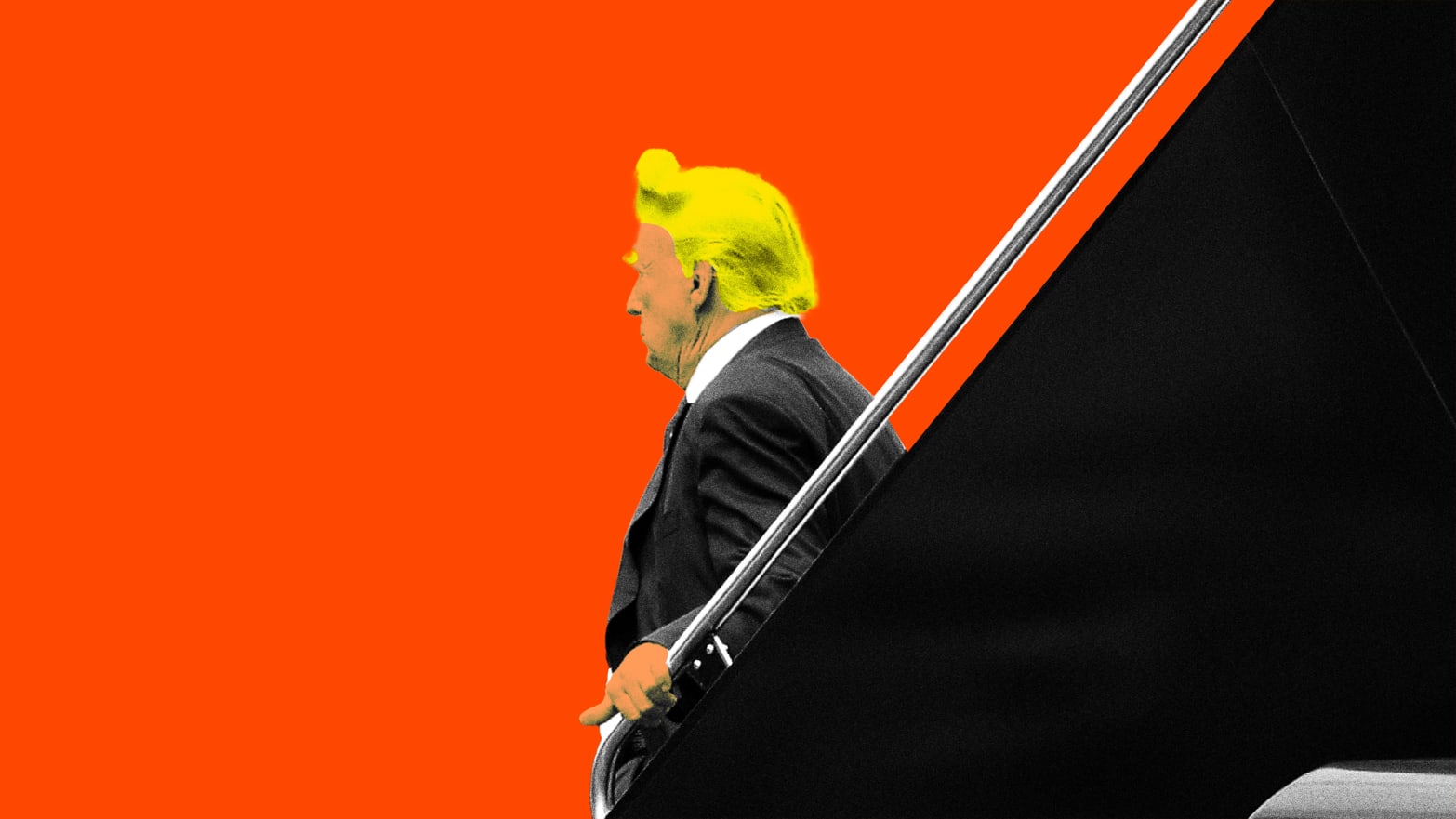Donald Trump pleaded not guilty in federal court Thursday afternoon to a four-count indictment accusing him of conspiring to overturn the 2020 presidential election result.
Trump entered the courtroom from a restricted area of the building, and sat with his hands clasped in front of him as he awaited the judge with his legal team.
“Donald J. Trump, John,” the twice-impeached and thrice-indicted former president said after U.S. Magistrate Judge Moxila A. Upadhyaya asked him to identify himself for the record. He gave his age as 77, and affirmed he was not under the influence of any medication that could affect his ability to understand the proceedings. Before releasing Trump on his own recognizance, Upadhyaya warned him not to speak about the case with any witnesses “except through counsel or in the presence of counsel.”
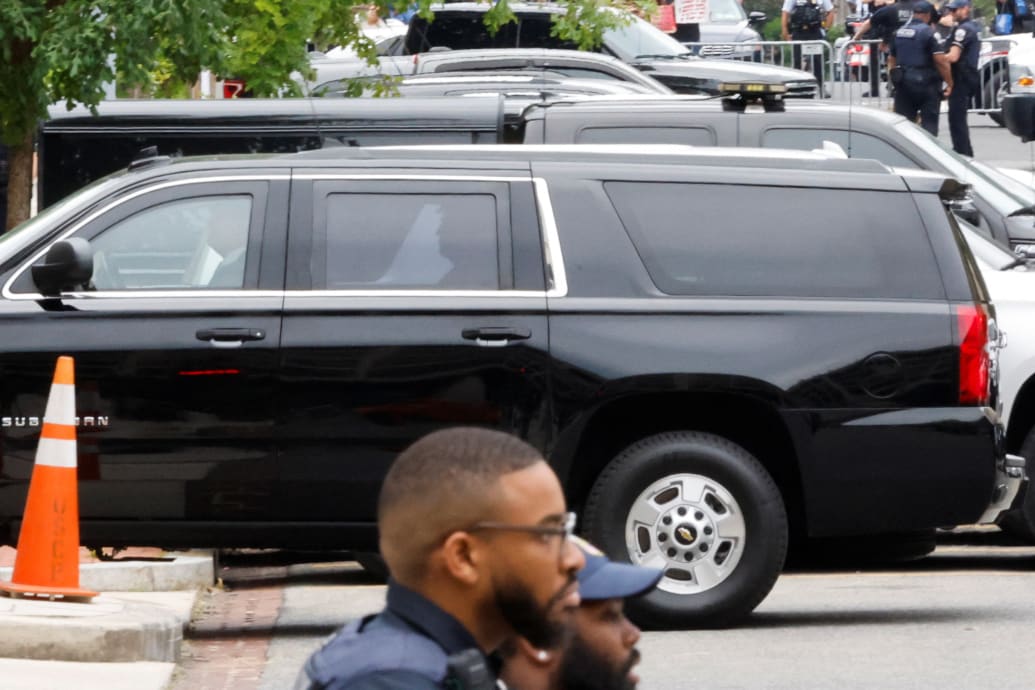
Trump pictured arriving at the courthouse.
REUTERS/Jonathan Ernst
Turnout was weak outside the courthouse as Trump arrived at his arraignment in the same D.C. courthouse in which countless MAGA faithful have been prosecuted for their roles in the failed attempt to keep Trump in power.
By most counts, only a small handful of people showed up to support Trump, far from the ravenous crowds he had apparently been hoping for. The disgraced one-termer arrived via motorcade before heading inside the E. Barrett Prettyman federal courthouse to be processed by the U.S. Marshals Service. While inside, a large contingent of uniformed police milled about outside, chatting, in the absence of much, if any, turmoil.
Despite writing in an all-caps social media post on Thursday that he was “GOING TO WASHINGTON, D.C., TO BE ARRESTED FOR HAVING CHALLENGED A CORRUPT, RIGGED, & STOLEN ELECTION,” Trump was not going to be arrested or detained—and wouldn’t even have his mugshot taken, Marshals spokesman Brady McCarron told The Daily Beast ahead of the arraignment. That’s because Trump was technically responding to a summons to appear, not showing up pursuant to an arrest warrant.
He was also given the option of being arraigned remotely, via video link. However, he opted to appear in person, leaving his Bedminster, New Jersey golf club around 1 p.m. for Newark Liberty International Airport and a flight to D.C.
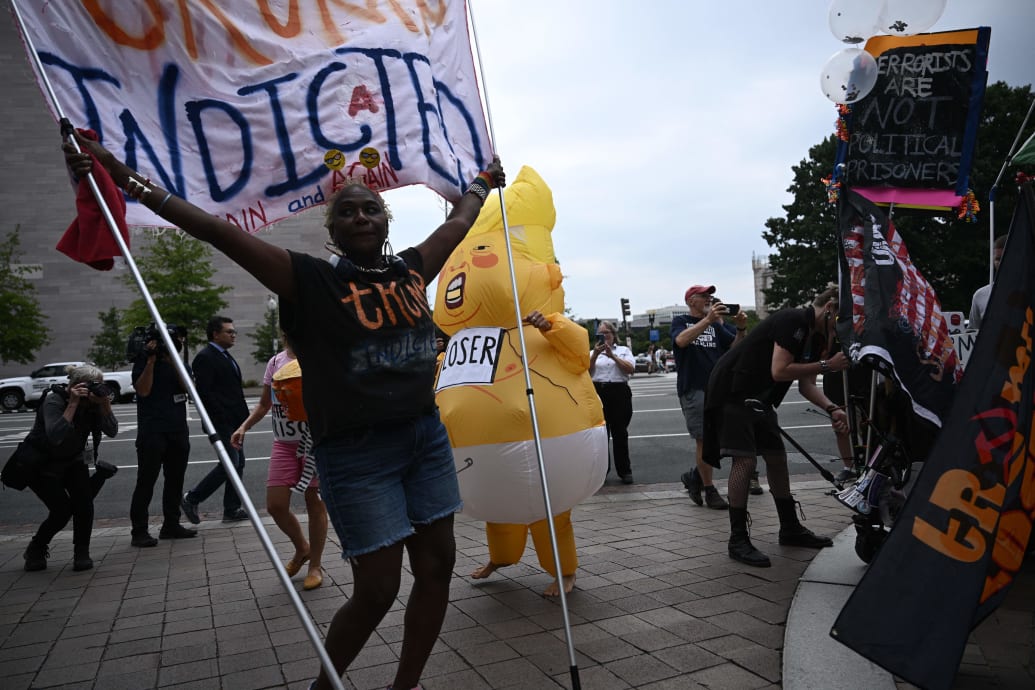
The turnout was muted outside the E. Barrett Prettyman U.S. Courthouse.
BRENDAN SMIALOWSKI/AFP via Getty
Once Trump and his legal team stepped inside the courthouse, he and his Secret Service detail are believed to have headed into a separate room where Marshals gathered basic information: his age, height, weight, and even his Social Security number. He was also expected to be digitally fingerprinted, as he was in Miami when he was arraigned there on separate criminal charges in June.
However, because this case is in a different court district, Trump had to go through the whole rigamarole again. He then headed over to be arraigned in Upadhyaya’s courtroom, where he joined Department of Justice Special Counsel Jack Smith and the prosecution team’s own security detail. In all, at least three different federal law enforcement agencies were guarding the group inside that building.
“It’ll be the safest place in America,” McCarron said.
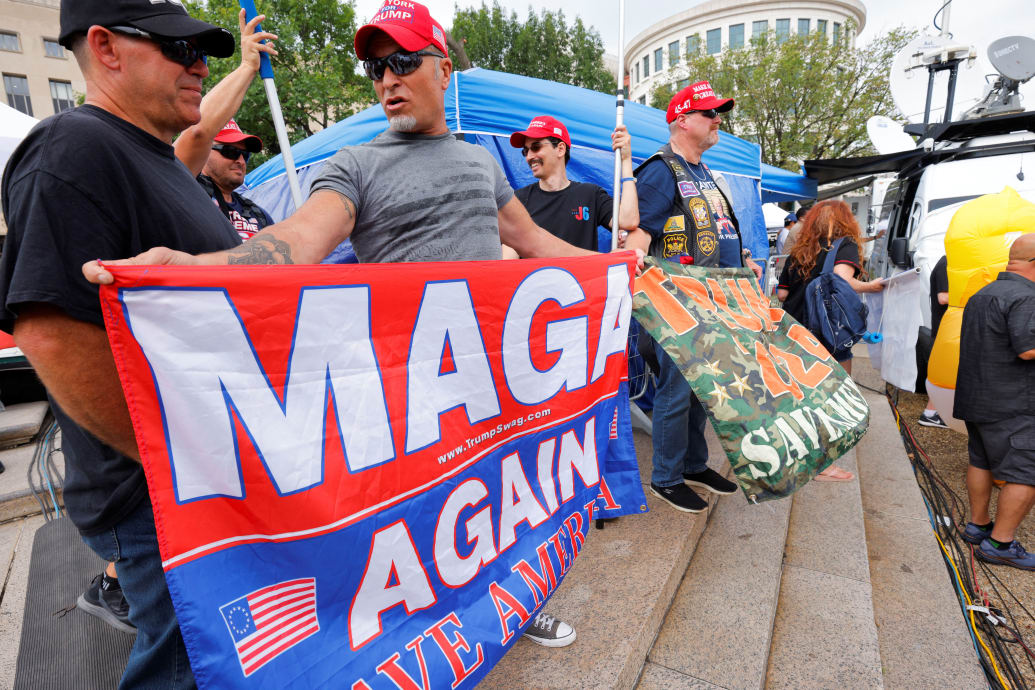
A small number of MAGA protesters were outweighed by opponents.
Reuters
The former president was represented in court by Tampa lawyer John F. Lauro, a relatively new addition to his legal team. He was also flanked by Todd Blanche, a New York attorney who is defending him in two other criminal cases.
So far, the prosecution team has consisted of Thomas Windom, a Maryland assistant U.S. attorney who joined the special counsel team early on, as well as J.P. Cooney and Molly Gaston, a pair of DOJ lawyers in Washington who successfully prosecuted right-wing media personality Steve Bannon last year.
After leaving the courthouse, Trump briefly spoke to reporters at the Reagan National Airport tarmac in Virginia before boarding his plane back to New Jersey.
“This was never supposed to happen in America,” he said while holding an umbrella in the rain. “We can’t let this happen in America.”
Alina Habba, an attorney for Trump’s 2024 presidential campaign, took questions from journalists outside the courthouse and railed against what she called a political “witch hunt” that was turning the U.S. into a “third world country.” She reframed the indictment as merely an attempt to crush Trump's First Amendment right to question the veracity of the 2020 election, asking, “What did he do?”
Meanwhile, small clutches of pro-Trumpers faced down larger numbers of pro-democracy protesters nearby. Earlier in the day, a member of the Proud Boys was sentenced inside the same building, to 75 days behind bars for his role in the Jan. 6 insurrection. Trump is accused of directing the mob to go to the Capitol that day “as a means to obstruct the certification and pressure the Vice President to fraudulently obstruct the certification” of Joe Biden’s electoral win.
Among those on the scene was 2024 GOP presidential candidate and staunch Trump supporter Vivek Ramaswamy, who has in the past slammed Trump over his false claims of voter fraud. Ramaswamy filmed a video in front of the courthouse, “making a demand to our government: tell us the truth about what’s really driving this flurry of prosecutions, with trial dates set during the height of the upcoming election.”
“That’s why I sued the DOJ this week to tell us exactly what Biden told Garland & what Garland told Jack Smith about the Trump indictments,” Ramaswamy tweeted. (Biden has said repeatedly that the White House maintains the proper distance from decisions made by DOJ.)
A faux presidential limo drove by the courthouse, flying miniature U.S. flags from the hood and carrying a person wearing a Trump mask. On the sidewalk, a protester dressed in an inflatable Trump costume crossed paths with another wearing a striped prison uniform.
The indictment against Trump charges him with four individual counts: conspiracy to defraud the United States, conspiracy to obstruct an official proceeding, obstruction of an official proceeding, and conspiracy against rights. Special Counsel Jack Smith, a former war crimes prosecutor at The Hague, alleges a widespread scheme by Trump and unindicted six co-conspirators to overturn his election loss. Central to the case is Trump’s knowledge that he didn’t win, but kept pushing anyway in the absence of any credible evidence of voter fraud extensive enough to have altered the outcome.
“At first I wasn't sure, but I have come to believe that he knew well that he had lost the election,” Trump’s former attorney general, William Barr, told CNN on Wednesday, describing his former boss’ post-election actions as “nauseating” and “despicable.”
Trump “belongs in prison,” former GOP Rep. Joe Walsh wrote for The Daily Beast, also on Wednesday.
“This is what Trump wanted,” Walsh wrote. “He wanted his supporters to be angry, furious, and incensed if he lost the 2020 election... He wanted chaos. He wanted his supporters to be so damn pissed off that they would use violence to keep him in office.”
The case itself will be overseen by U.S. District Judge Tanya S. Chutkan, who has sentenced at least 38 Capitol rioters to prison terms ranging from 10 days to more than five years, according to an Associated Press analysis.
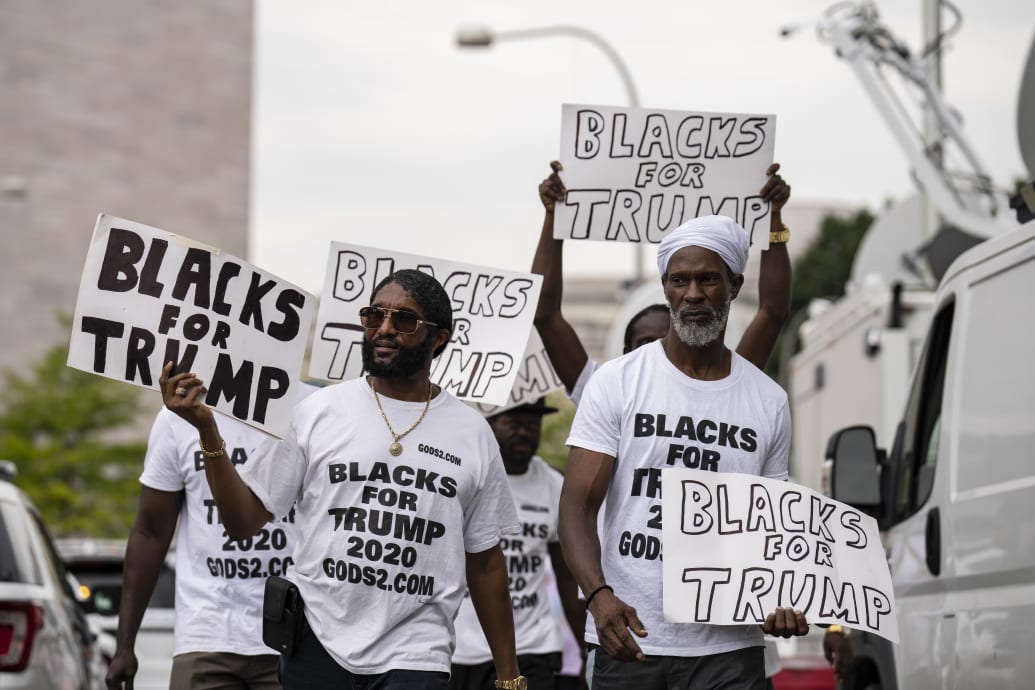
Trump supporters demonstrate outside the courthouse on Thursday.
Drew Angerer/Getty
Trump is also facing another federal indictment over his alleged retention of classified documents after leaving office, storing highly sensitive national defense information and other secrets at his Mar-a-Lago resort in Florida. In a separate legal case about Trump withholding White House documents from lawmakers investigating the Capitol riot, Chutkan already shot down Trump’s often less-than-sound legal defenses, rejecting his attempt to claim executive privilege over the cache of official materials.
“Presidents are not kings, and [Trump] is not President,” Chutkan wrote in her ruling.
Other judges presiding over Jan. 6 cases have “typically” meted out sentences less harsh than the punishments floated by prosecutors, according to the AP. But Chutkan has “matched or exceeded prosecutors’ recommendations in 19 of her 38 sentences,” the wire service reported. “In four of those cases, prosecutors weren’t seeking any jail time at all.”
Chutkan has said previously that those involved in Jan. 6 must be held accountable to head off future attacks.
“Every day we’re hearing about reports of anti-democratic factions of people plotting violence, the potential threat of violence, in 2024,” Chutkan said in 2021 as she sentenced 54-year-old Robert Scott Palmer to more than five years behind bars. “It has to be made clear that trying to violently overthrow the government, trying to stop the peaceful transition of power and assaulting law enforcement officers in that effort is going to be met with absolutely certain punishment.”
Palmer, for his part, appealed to Chutkan for mercy in a letter to the court, insisting that he and other Trump supporters “were lied to by those at the time who had great power.” This included, according to Palmer’s handwritten letter, “the sitting president, as well as those acting on his behalf.”
“They kept spitting out the false narrative about a stolen election and how it was ‘our duty’ to stand up to tyranny,” Palmer wrote. “Little did I realize that they were the tyrannical ones desperate to hold onto power at any cost even by creating the chaos they knew would happen with such rhetoric.”
